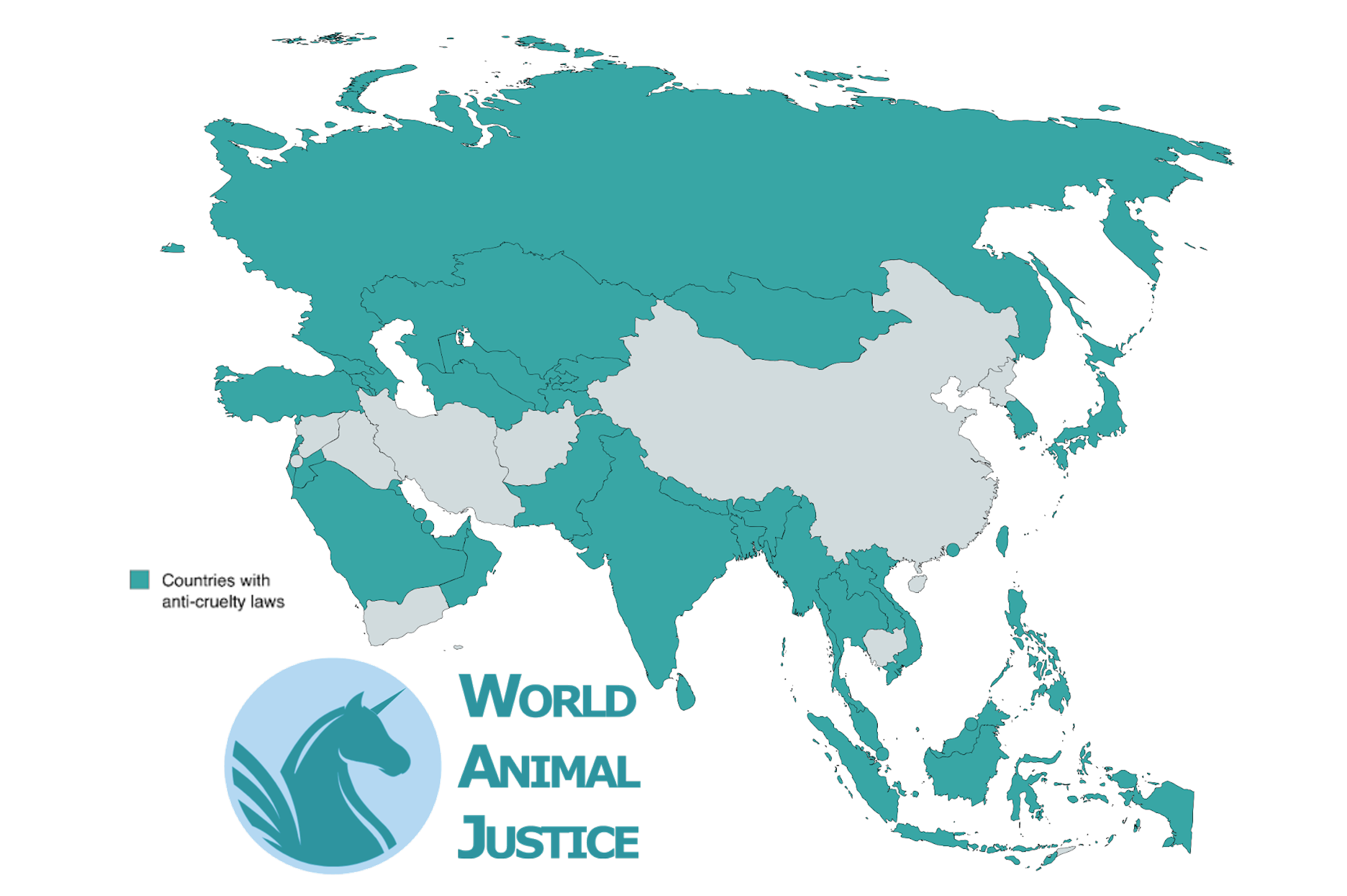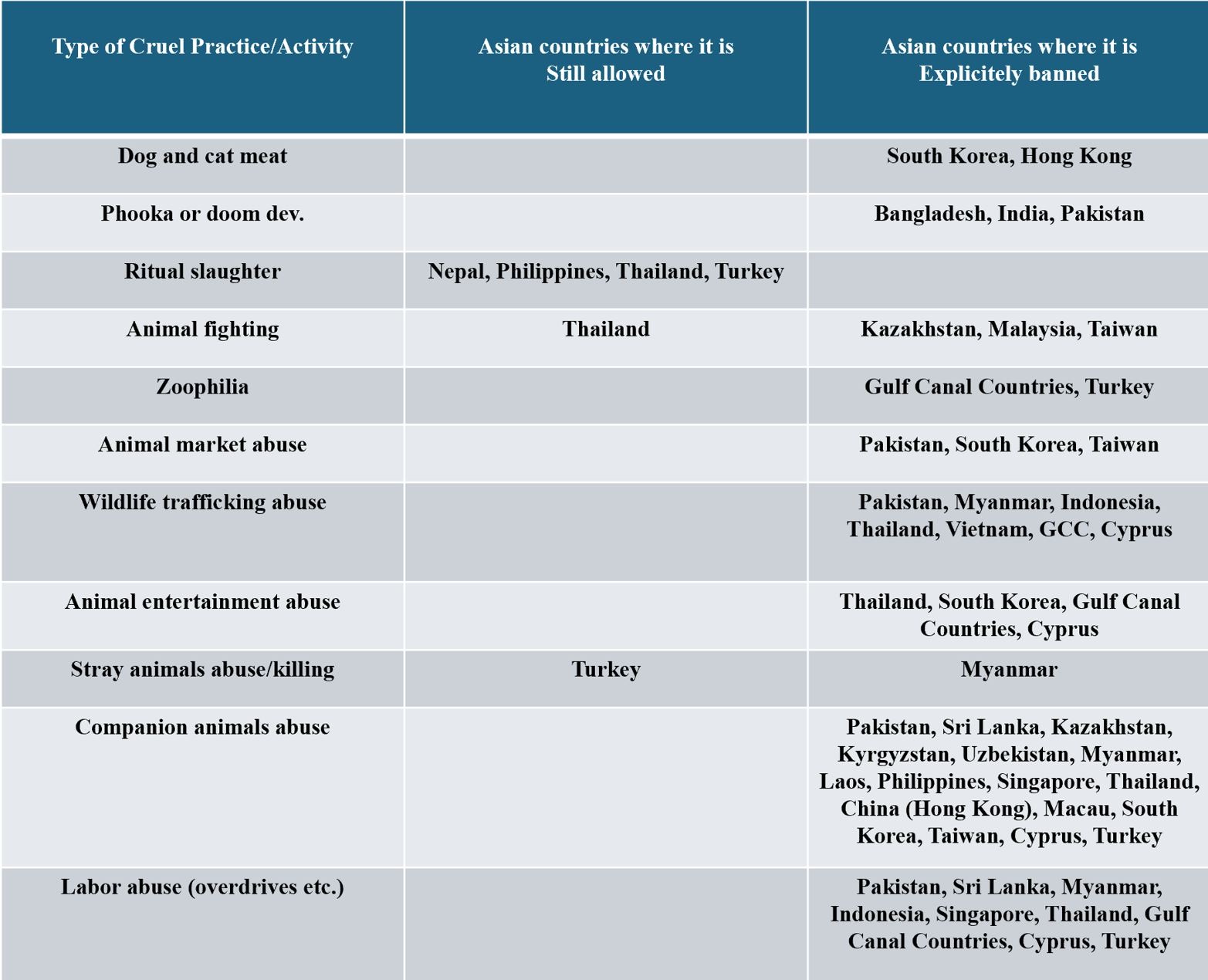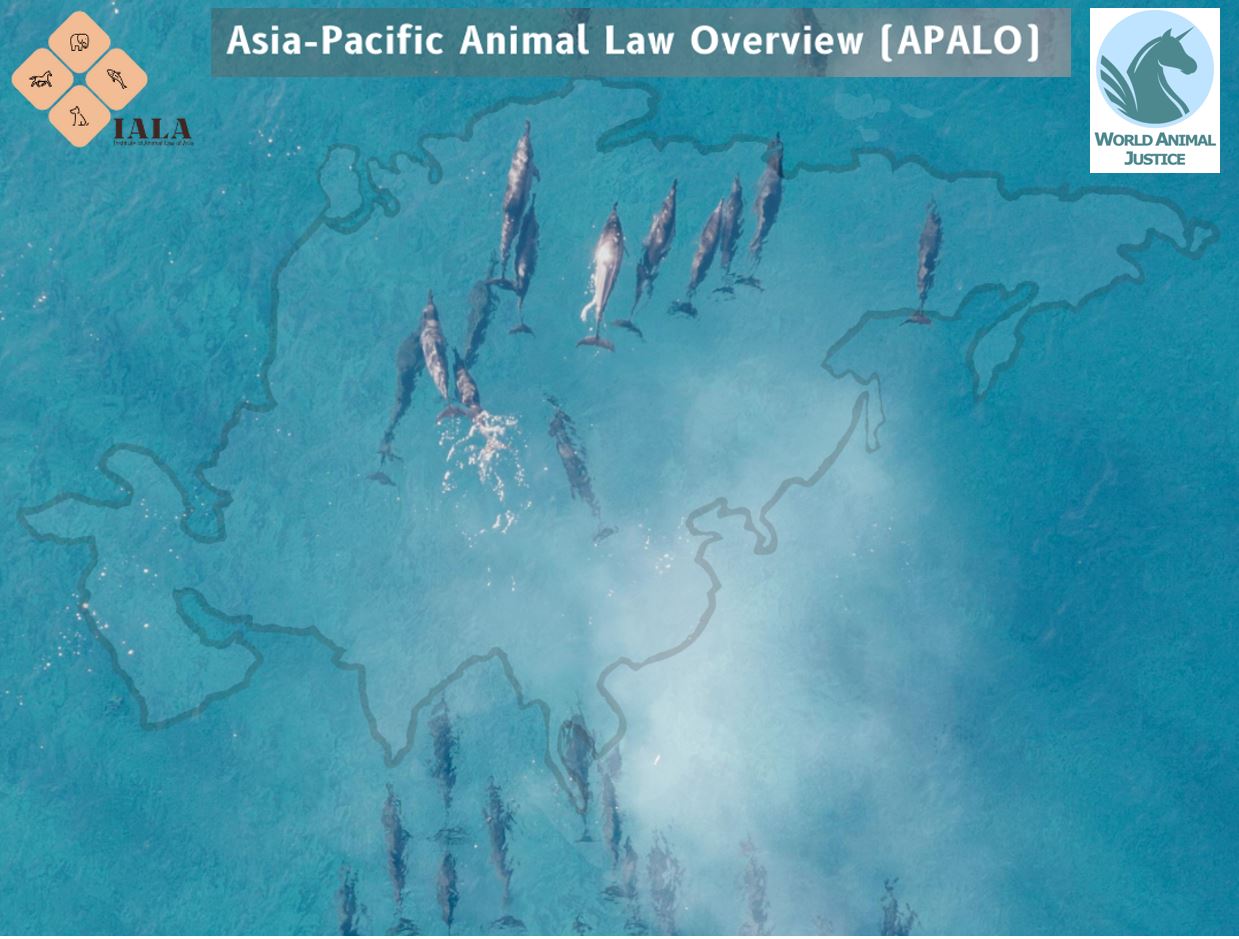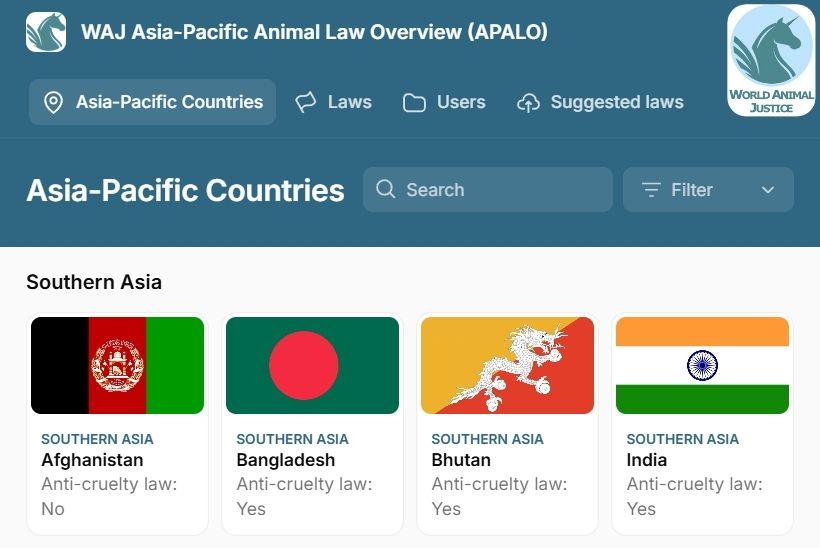Analysis resulting from findings of the Asia-Pacific Animal Law Overview (APALO) - Project led by World Animal Justice on Animal Anti-Cruelty Laws in Asia & Pacific
Introduction
Asia is a continent where diverse cultures, religions and customs intertwine, which is reflected in the legislation of different countries. Animal protection and the fight against cruelty vary depending on the region, cultural norms and level of legislative development. Some Asian countries have implemented strict laws providing for severe penalties for cruelty to animals, while others continue to face challenges in their implementation. This article analyzes the legislation of various Asian countries in the field of animal protection, identifies key differences and features, and outlines trends and problems in this area.
1- Asian sub-regions
- South Asia
In South Asia, some strict laws are present in countries such as the Maldives and Pakistan. Cruelty to animals here is punishable by a significant fine or imprisonment for up to eight years. In Bhutan, the punishment is more lenient – in the form of a fine. A number of countries in the region also have laws that protect sacred animals based on religious norms. For example, in Nepal, cruelty to cows is prohibited and punishable by up to three years in prison. However, in countries like Bangladesh and India, while certain forms of animal cruelty, such as the traditional practice of phooka, are prohibited, this abuse may continue in practice despite existing laws.
- Central Asia
Animal protection laws in Central Asian countries cover both domestic and wild animals. Unlike South Asia, Central Asian laws are more objective and fair in relation to all species of animals, regardless of their sacred or cultural status. Kazakhstan is the most progressive of all Central Asian countries regarding animal rights protection, with a separate law on responsible treatment of animals. In general, the maximum penalty for illegally killing an animal in this subregion is from fifty days to six months to three years in prison.
- Southeast Asia
Southeast Asia has a wide range of animal protection laws. Some countries in the region have introduced strict penalties for animal cruelty, while others have more lenient laws. Thus, Malaysia and Singapore stand out for their particularly strict laws in this area, while countries such as Brunei and Myanmar have more vague and generally less strict rules. Particular attention in this region is paid to regulating the transport of wild and rare animals, which is an important aspect of protecting biodiversity.
- East Asia
In East Asia, Japan, South Korea and Hong Kong have some strict laws. Although Hong Kong is a special administrative region of China, it has its own animal protection laws. For example, like South Korea, it prohibits the use of dogs and cats as food. In other countries, such as North-Korea or Mongolia, there is little information on animal protection laws due to the isolation of these states, which makes it difficult to assess the real state of affairs in this area.
However, we know that China (apart Hong-Kong) and North-Korea do not have law to protect animals against cruelty to date.
In Japan, let’s raise the well-known issue with marine mamals and the continued hunting of whales and cetaceans despite the Moratorium on Commercial Whaling, not respected by Japan, which have left the International Whaling Commission in 2019.
- West Asia
In West Asian countries, animal protection laws vary from country to country. In some countries, such as Azerbaijan and Armenia, laws are limited to controlling fishing and hunting, and there are few measures to protect animals from cruelty. At the same time, Gulf countries such as the UAE and Cyprus have some of the strictest laws in the region. For example, in Cyprus, killing an animal is punishable by a fine of €20,000 or up to five years in prison. In Turkey, despite stories of caring for stray animals, the law allows for the killing of animals for religious ceremonies, which creates a contradictory picture.
- Russia
Russia has strict laws against animal cruelty, illegal hunting, and violations of veterinary rules. Cruelty to animals with intent to cause pain or suffering can lead to fines up to RUB 80,000 or imprisonment for up to 3 years. Illegal hunting, especially with prohibited methods or on protected lands, can result in fines up to RUB 1,000,000 or up to 4 years in prison. Violating veterinary regulations that spread diseases and trading endangered species are also heavily penalized. These laws emphasize Russia’s commitment to animal and environmental protection.
– Countries without anti-cruelty laws:
Several countries, particularly in Asia, lack comprehensive anti-cruelty laws. For instance, nations like Syria, Cambodia, Iraq, and Afghanistan do not have specific legislation aimed at preventing cruelty to animals. While they may have laws that touch on animal welfare, these are often limited to controlling diseases in animals that could threaten human health, rather than addressing the broader issue of protecting animals from harm or cruelty.
In these countries, the focus is primarily on human welfare. The laws are designed to safeguard public health rather than recognizing animals’ rights or their inherent value. Even in economically developed countries such as China, there is a noticeable absence of comprehensive legal frameworks dedicated to animal protection.
The emphasis in such regions remains on protecting people, with little to no consideration for the well-being or rights of animals themselves.
Conclusion
An analysis of the legislation of various Asian countries shows that despite the significant diversity of animal protection laws, many of them remain at the theoretical level and are rarely applied in practice. Lawyers and animal rights activists can refer to existing laws, but the reality shows that the society and government of most countries in the region still do not recognize animals as independent beings with the right to a dignified life.
Thus, Asia is a unique region with a diverse legislative landscape regarding animal protection. Some countries, such as Cyprus, Pakistan, Singapore and South Korea, or countries of Gulf Canal Countries have adopted strict laws with harsh penalties for violators, while others have smaller fines and less stringent measures. This diversity reflects the cultural, religious and social background of each region, highlighting the complexity and layering of animal welfare efforts on the continent.
This region of the world encompasses a wide diversity for penalties regarding anti-cruelty laws. For example in Bhutan, only a fine, or in Kazakhstan, one year imprisonment for killing an animal, whereas in Cyprus, the law provides for five years of imprisonment for this case.
Laws are just one aspect that impacts animal welfare. Despite having laws in place, many countries face challenges in their implementation and control. The path to improving the animal protection situation in Asia requires not only the adoption of strict laws, but also increased public awareness, increased law enforcement and international cooperation in this area.
No Animal Anti-Cruelty Laws assorted of penalties for mistreatments were found in 9 Asian countries :
Afghanistan, Cambodia, Timor-Leste, Iraq, Yemen, Syria, Iran, North-Korea, China (outside Hong-Kong)
Animal Anti-Cruelty Laws in Asia

2- Pacific Sub-region
Analysis of Animal Offences and Penalties in New Zealand and Australia.
- New Zealand
New Zealand’s animal welfare laws aim to prevent cruelty, ensure proper care, and promote the overall well-being of animals. Offences include neglecting animals in need, causing pain or distress during killing, and keeping animals in poor conditions. Penalties for these offences can involve imprisonment or fines, with corporations facing higher fines. Specific rules also govern animal treatment during transportation to prevent unnecessary suffering. - Australia
Australia’s animal welfare laws are more detailed and cover a wider range of offences. Beyond basic cruelty and neglect, they address specific acts like physical abuse, abandonment, and the use of harmful devices. Aggravated cruelty, leading to serious injury or death, carries even harsher penalties. Australia’s regulations also cover industries like commercial farming and activities such as greyhound racing and rodeos.
Each state has its own legislation, with varying penalties and definitions of cruelty.
– In New South Wales, cruelty to animals can result in fines of up to 2,000 penalty units for corporations, and up to one year of imprisonment for individuals. Aggravated cruelty can lead to fines of 5,000 penalty units or two years in prison.
– In Northern Territory, cruelty offences, such as intentional harm or suffering, carry penalties of 200 units or up to two years of imprisonment.
– Queensland imposes fines of up to 2,000 units or three years’ imprisonment for cruelty, including unjustifiable pain or improper confinement.
– In South Australia, aggravated animal cruelty can result in fines of $50,000 or four years of imprisonment.
– Tasmania penalties include fines of up to 500 units for cruelty, while aggravated cruelty can result in up to five years in prison.
– Victoria laws impose fines of up to 250 penalty units or one year of imprisonment for cruelty, with aggravated cruelty punishable by up to two years.
– Western Australia has the harshest penalties, with fines up to $50,000 and five years of imprisonment for acts such as torturing or neglecting animals.
Comparison
While both countries have strong protections for animals, Australia’s laws are more specific and impose tougher penalties, especially for aggravated cruelty. New Zealand’s laws, although strict, offer comparatively lighter penalties.
Conclusion
Both New Zealand and Australia are committed to protecting animals, but Australia takes a broader and stricter approach to animal welfare offences, ensuring that serious cases of cruelty receive heavier punishments.

Conclusion
The comparative analysis of animal anti-cruelty laws across Asia and the Pacific underscores significant regional variations in the legal protection of animals. In Asia, while countries like Pakistan, South Korea, and Cyprus have implemented strict animal welfare laws, others face challenges due to cultural, religious, or political factors that affect both legislation and enforcement. Many countries, such as Afghanistan, Cambodia, and China (outside of Hong Kong), still lack comprehensive legal frameworks dedicated to animal welfare, focusing more on human health and economic considerations.
In contrast, the Pacific sub-region, particularly New Zealand and Australia, presents a more developed and structured approach to animal welfare. Both countries have comprehensive legislation, but Australia adopts a broader and stricter approach, with detailed laws addressing various forms of cruelty, neglect, and industry-specific practices. Australian states impose varying penalties, with Western Australia having the harshest sanctions, including fines of up to $50,000 and imprisonment for up to five years for severe cruelty cases. New Zealand’s laws, while similarly robust, focus on preventing cruelty, ensuring proper care, and regulating animal transport to avoid unnecessary suffering.
Recommendations for Animal Law Advocacy:
- Strengthen Legal Frameworks in Asia: Countries with limited or absent anti-cruelty laws, such as Afghanistan and China, should be encouraged to develop comprehensive legislation that explicitly protects animals from harm and cruelty.
- Improve Enforcement: In countries where laws exist but are poorly enforced, such as India and Bangladesh, efforts should focus on strengthening law enforcement capabilities and creating specialized units to handle animal welfare cases.
- Public Awareness Campaigns: To bridge the gap between law and practice, public education is critical. Increasing awareness of animal welfare and promoting humane treatment can lead to greater public demand for stronger protections.
- Tailored Legal Approaches: Advocacy efforts in culturally sensitive regions should consider local customs and religious practices while promoting cruelty-free alternatives. This approach can help align animal protection with traditional values.
- International Cooperation: Greater regional and global collaboration can facilitate the sharing of best practices and resources for improving animal protection across borders. In the Pacific, for example, New Zealand and Australia’s strong legal frameworks could serve as models for neighboring countries.
In summary, while animal welfare legislation in Asia and the Pacific shows considerable diversity, there is significant room for improvement across the continent. Strengthening legal protections, improving enforcement, and raising public awareness are key steps towards ensuring that animals across the region are treated with dignity and respect.




